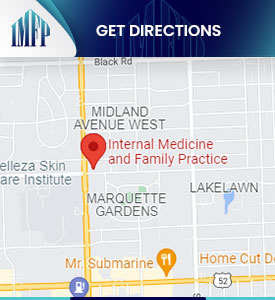Essential Tips for Preventing Dehydration in Children and Adults
Stay hydrated by drinking plenty of water throughout the day and consuming water-rich foods like fruits and vegetables. Pay attention to signs of dehydration, such as dry mouth and fatigue, and increase fluid intake during hot weather or physical activity. Dr. Wael Mctabi, MD, and Dr. Samiullah Choudry are here to provide you with the care you need. For more information, contact us or book an appointment online today! We are conveniently located at 1719 Glenwood Ave Joliet, IL 60435.




Table of Contents:
What are the key signs of dehydration in children and adults?
How does the need for hydration change with activity levels?
What foods can help maintain hydration in children and adults?
What hydration tips are essential during hot weather?
At Internal Medicine & Family Practice in Joliet, we understand the importance of diagnosing and treating dehydration promptly to prevent severe complications. Dehydration can affect both children and adults, causing a range of symptoms, with different age groups often displaying different signs. However, there are common symptoms to look out for in all individuals.
Adults experiencing dehydration might feel an intense thirst, often a primary indicator. However, by the time thirst sets in, you could already be in a state of dehydration. Other symptoms include dry mouth, eyes, and skin, infrequent urination or dark yellow urine, fatigue or weakness, impaired cognitive function, and headaches. Severe or prolonged dehydration can cause confusion, particularly in older adults, dizziness, lightheadedness, and muscle cramps.
Children are particularly susceptible to dehydration due to their smaller body size and higher metabolic rate. Key signs in children include a decrease in urine output, dry and sticky mouth, sunken or hollow eyes, lethargy, irritability, and even fever. Rapid breathing, heartbeat, and reduced skin elasticity are also common symptoms.
Severe dehydration can lead to rapid breathing, a rapid heartbeat, sunken eyes, and fainting in both adults and children. If these severe symptoms are present, it’s important to seek immediate medical assistance.
Engaging in physical activities such as exercise or heavy labor causes the body to lose fluids through sweat, increasing the need for hydration. This is particularly important for our patients who engage in regular exercise or physically demanding jobs. The intensity and duration of these activities, as well as environmental conditions, can influence your hydration needs. For instance, exercising in hot weather may require you to drink more water than when exercising in cooler conditions due to increased sweat production.
We recommend drinking fluids before, during, and after physical activity to maintain hydration. For patients involved in strenuous activities like long-distance running or competitive sports, our healthcare professionals can provide advice on more diligent hydration strategies, including regular fluid consumption throughout their workout.
Sweating also results in the loss of electrolytes, which are essential for balancing water in your body, maintaining your body’s pH level, and aiding in waste removal from your cells. Along with water, consuming sports drinks or foods high in electrolytes can help replenish these essential minerals. In extreme cases, our team can provide specialized hydration protocols that involve consuming fluids with specific electrolyte concentrations.
Conversely, during sedentary activities like reading or watching television, the body doesn’t sweat as much, reducing the need for hydration. However, we still recommend regular water intake to maintain hydration, as the body continually loses water through natural processes like breathing and digestion. It’s also important to be mindful of potential dehydration during periods of high ambient temperatures or certain medical conditions, such as fever or gastrointestinal illness.
At Internal Medicine & Family Practice, we understand that the need for hydration directly correlates with activity levels and lifestyle. Whether you lead an active or sedentary lifestyle, our healthcare professionals can provide personalized recommendations on fluid intake to prevent dehydration and maintain optimal hydration. Contact us today to schedule a consultation and learn more about how proper hydration can improve your health and well-being.
Foods like cucumber, watermelon, citrus fruits, strawberries, and vegetables like lettuce, celery, and radishes contain high water content making them excellent foods to maintain hydration levels. They also provide essential vitamins, minerals, and other nutrients necessary for overall health, all of which align with our focus on comprehensive wellness at IMFP.
Hydrating with Soups and Smoothies:
Clear soups and fresh fruit/vegetable smoothies are not only delicious but can also contribute to your hydration. These options are also in line with the dietary advice we provide to our patients at IMFP, especially those who might be recovering from illness or surgery.
Dairy and Plant-Based Milk:
Cow’s milk and plant-based milk (almond, soy, oat) provide hydration and contain essential nutrients like calcium and protein. Yogurt is also a good source of fluid, probiotics, and electrolytes. At IMFP, we often recommend these to our patients, especially those following specific dietary needs or restrictions.
Electrolyte-Enhanced Beverages:
Sports drinks and oral rehydration solutions (ORS), while not a substitute for water, can be beneficial for rehydration after intense physical activities or during illness. This can be particularly important for our patients at IMFP who are managing chronic diseases or recovering from acute illness.
Hydration Tips:
As part of our comprehensive care at IMFP, we remind our patients to frequently sip water throughout the day, include hydrating foods in their diet, and monitor their hydration levels. If you experience symptoms of dehydration, such as thirst, dizziness, or muscle cramps, we encourage you to seek immediate medical attention.
In conclusion, while drinking water should always be your first choice for staying hydrated, incorporating these hydrating foods into your diet can further help maintain hydration levels. At Internal Medicine & Family Practice, we’re committed to providing you with practical and effective ways to maintain your health and wellness.
As the summer months approach and temperatures increase in Joliet, understanding how to stay hydrated in hot weather is crucial to maintaining good health and ensuring your body functions optimally. Here are some essential hydration tips from our medical professionals to help you avoid dehydration:
Drink Fluids Regularly:
• We recommend drinking plenty of water. While the common guideline is eight glasses per day, you might require more during hot weather.
• Thirst is not just a discomfort – it’s a warning sign from your body that it’s already dehydrating. Regularly sipping water throughout the day, even if you don’t feel thirsty, is advisable.
• Consuming beverages that replenish electrolytes, such as sports drinks, can also aid hydration. However, our team at IMFP cautions against excessive consumption of sports drinks, which often contain added sugars.
Hydrate Before and After Exercise:
• At IMFP, we advise drinking water or sports drinks before, during, and after physical activity to replace lost fluids and electrolytes. This is especially important as exercise increases fluid loss through sweat.
Choose Water-Rich Foods:
• Incorporating water-rich foods into your diet, such as cucumbers, watermelon, and strawberries, can contribute to your daily fluid intake. Our IMFP nutritionists can provide more information on this and other healthy snack options.
Avoid Dehydrating Beverages:
• Avoid alcohol and caffeinated beverages, which can increase your body’s water loss and make you more susceptible to dehydration. If you do consume these, balance them out with plenty of water.
Monitor Urine Color:
• At IMFP, we recommend checking the color of your urine as a gauge of hydration. Clear or light yellow urine indicates adequate hydration, while dark yellow or amber-colored urine suggests you may be dehydrated.
Recognize Signs of Dehydration:
• Signs and symptoms that may indicate dehydration include thirst, fatigue, dizziness, nausea, and muscle cramps. Contact our IMFP team promptly if severe dehydration is suspected.
Additional Considerations:
• We recommend wearing lightweight, loose-fitting clothing to stay cool and reduce the need to sweat.
• Try to stay in air-conditioned environments during the hottest parts of the day.
• Everyone’s hydration needs are different. Factors like age, activity level, and overall health, areas that our IMFP team specializes in, can affect how much water you need.
• Consider using a water bottle or hydration pack to help you stay hydrated throughout the day.
• Always listen to your body and drink fluids whenever you feel the need.
By following these essential hydration tips from our team at Internal Medicine & Family Practice, you can ensure you stay adequately hydrated during hot weather and protect yourself against the risks associated with dehydration.
Dehydration can affect both children and adults, especially during hot weather or illness. At Internal Medicine and Family Practice in Joliet, IL, Dr. Samiullah Choudry educates patients on recognizing the signs of dehydration and maintaining proper hydration through balanced fluids and electrolytes. Whether caused by heat, exercise, or medical conditions, Dr. Choudry’s preventive tips and care strategies help you stay energized, avoid complications, and support your body’s natural balance throughout the year.
For more information, contact us or book an appointment online today! We are conveniently located at 1719 Glenwood Ave Joliet, IL 60435. We serve patients from Joliet IL, Plainfield IL, Lockport IL, Channahon IL, Romeoville IL, Manhattan IL and surrounding areas.
Check Out Our 5 Star Reviews








